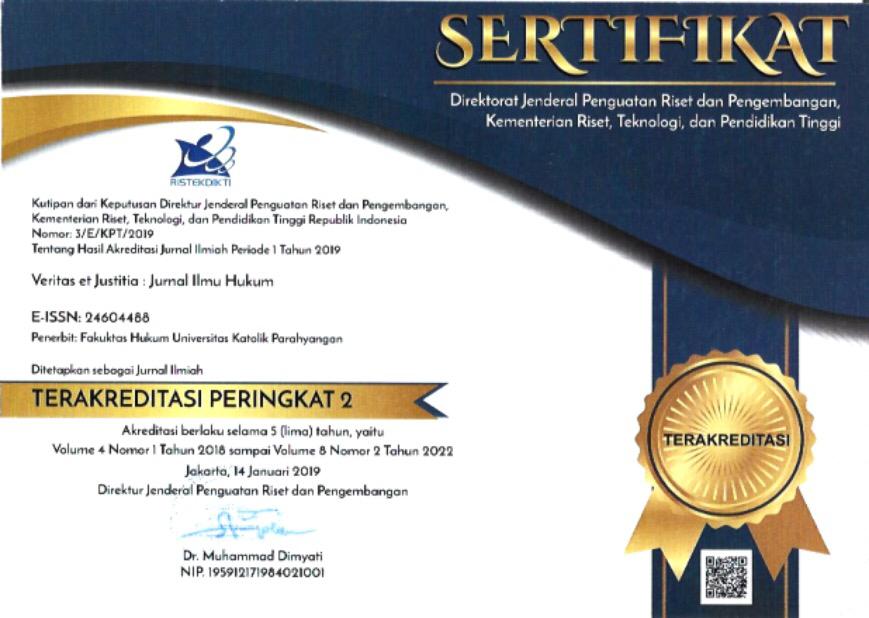KRITERIA KRIMINALISASI: ANALISIS PEMIKIRAN MOELJATNO, SUDARTO, THEO DE ROOS, DAN IRIS HAENEN
DOI:
https://doi.org/10.25123/vej.v8i2.4923Kata Kunci:
criminal law; criminalization; criminal offense; ultimum remediumAbstrak
In criminal law, “criminalization” is defined as a process of determining certain conduct as a criminal offense through legislation. This doctrinal legal research article describes and analyzes the criteria for criminalization as promulgated by Moeljatno, Sudarto, Theo de Roos, and Iris Haenen. Moeljatno’s criteria are: 1) the conduct is harmful to the public, 2) criminalization is the primary means to deter the harmful conduct, and 3) the government’s ability to effectively enforce the criminal provision. Sudarto promulgates three criteria: 1) harmfulness of the conduct, 2) cost and benefit analysis, and 3) law enforcement burden. Furthermore, Theo de Roos’ six criteria are: 1) feasibility and motivation of harm, 2) tolerance, 3) subsidiarity, 4) proportionality, 5) legality, and 6) practical applicability and effectiveness. Lastly, based on de Roos’ typology Iris Haenen formulates three criteria: 1) primary criteria, which contains “threshold principles”: the conduct must be a) harmful and b) wrongful, 2) secondary criteria, which contains “moderating principles”: proportionality, subsidiarity, and effectiveness, and 3) legality criterion (lex certa). The criteria for criminalization can be employed by the legislators and general public in scrutinizing the feasibility of criminalization of a conduct, to ensure that only the conducts which meet all the criteria that can be criminalized. Only by doing so will the practice of criminalization adhere to the ultimum remedium principle and deter unnecessary criminalization and overcriminalization.
Referensi
Buku:
A.K. Bosma dan S.S. Buisman, Inleiding: Evidence-based onderzoek in wetgeving en rechtspraak, dalam A.K. Bosma dan S.S. Buisman (ed.), Methoden van onderzoek in het strafrecht, de criminologie en de victimologie, Wolters Kluwer, Tilburg, 2018.
Anugerah Rizki Akbari, Potret Kriminalisasi Pasca Reformasi dan Urgensi Reklasifikasi Tindak Pidana di Indonesia, Institute for Criminal Justice Reform, Jakarta, 2015.
C.P.M. Cleiren, Functie en waarde van criteria voor strafbaarstelling in het huidig tijdsgewricht, dalam C.P.M. Cleiren et. al., Criteria voor strafbaarstelling in een nieuwe dynamiek, Boom Lemma Uitgevers, Den Haag, 2012.
Douglas Husak, Overcriminalization: The Limits of the Criminal Law, Oxford University Press, New York, 2008.
Iris Haenen, Force & Marriage: The criminalisation of forced marriage in Dutch, English and international criminal law, Intersentia, Cambridge – Antwerp – Portland, 2014.
Johannes Keiler dan David Roef, Principles of Criminalisation and the Limits of Criminal Law, dalam Johannes Keiler dan David Roef (ed.), Comparative Concepts of Criminal Law, Intersentia, Cambridge – Antwerp - Chicago, 2021.
Martine Boersma, Corruption: A Violation of Human Rights and a Crime Under International Law?, Intersentia, Cambridge – Antwerp – Portland, 2012.
Moeljatno, Asas-asas Hukum Pidana, Rineka Cipta, Jakarta, 2015.
Moeljatno, Fungsi dan Tujuan Hukum Pidana Indonesia dan Rencana Undang-Undang tentang Asas-asas dan Dasar-dasar Pokok Tata Hukum Indonesia, Bina Aksara, Jakarta, 1985.
Muladi dan Barda Nawawi A., Teori-teori dan Kebijakan Pidana, Alumni, Bandung, 1984.
Peter Mahmud Marzuki, Penelitian Hukum, Kencana, Jakarta, 2019.
Piet Hein van Kempen, Criminal Policy and Criminal Justice Statistics, dalam Piet Hein van Kempen, Maartje Krabbe, dan Sven Brinkhoff (ed.), The Criminal Justice System of the Netherlands, Intersentia, Antwerpen - Cambridge, 2019.
Soetandyo Wignjosoebroto, Ragam-ragam Penelitian Hukum, dalam Sulistyowati Irianto dan Shidarta (ed.), Metode Penelitian Hukum: Konstelasi dan Refleksi, Yayasan Pustaka Obor Indonesia, Jakarta, 2011.
Sudarto, Hukum dan Hukum Pidana, Alumni, Bandung, 1983.
Sudarto, Hukum Pidana dan Perkembangan Masyarakat: Kajian terhadap Pembaharuan Hukum Pidana, Sinar Baru, Bandung, 1983.
Teguh Prasetyo, Kriminalisasi dalam Hukum Pidana, Nusamedia, Bandung, 2013.
Topo Santoso, Hukum Pidana: Suatu Pengantar, Rajawali Pers, Depok, 2020.
Valerine J. Kriekhoff, Penelitian Hukum Normatif dalam Hukum Pidana: Metode dan Aplikasinya, dalam Jufrina Rizal dan Suhariyono AR (ed.), Demi Keadilan: Antologi Hukum Pidana dan Sistem Peradilan Pidana, Pustaka Kemang, Jakarta, 2016.
Tesis:
K. Keeris, Sexting assessed and examined in light of the criteria for criminalization of De Roos (tesis master di Tilburg University, 2020).
Mark van der Heijden, Strafbaarstelling van downloaden? Een toetsing van het kabinetsvoornemen om het downloaden van auteursrechtelijk beschermd material voor eigen gebruik strafbaar te stellen aan de criteria voor strafbaarstelling van De Roos (tesis master di Tilburg University).
Artikel Jurnal:
M.S. Groenhuijsen, Criteria voor strafbaarstelling, Delikt en Delinkwent 23 (1993).
Mahrus Ali, Overcriminalization dalam Perundang-undangan di Indonesia, Jurnal Hukum Ius Quia Iustum No. 3 Vol. 25 September 2018.
S.S. Buisman, Criteria voor Strafbaarstelling: De integratie tussen theorie en wetgevingsbeleid, Boom Strafblad 2020-1.
Salman Luthan, Asas dan Kriteria Kriminalisasi, Jurnal Hukum Ius Quia Iustum, Vol. 16, No. 1, 2009.
Th. A. de Roos, Nieuwe accenten in het criminaliseringsbeleid: Risicobeheersing en bescherming van kwetsbaren, dalam Criminalisering, Justitiele verkenningen, jrg. 26, nr. 5, 2000.
Sumber Daring
Advocatenblad edisi November 2015, https://assets.budh.nl/advocatenblad/ article_pdf/20093311/basis_pdf_oid.pdf.
Gerald Dworkin, Paternalism, The Stanford Encyclopedia of Philosophy (Fall 2020 Edition), Edward N. Zalta (ed.), https://plato.stanford.edu/archives/ fall2020/entries/paternalism/.
Peraturan Perundang-undangan
Kitab Undang-Undang Hukum Pidana.
Undang-Undang Nomor 12 Tahun 2011 tentang Pembentukan Peraturan Perundang-undangan, LN RI Tahun 2011 Nomor 82, TLN RI Nomor 5234.
Rancangan Peraturan Perundang-undangan
Rancangan Undang-Undang tentang Hukum Pidana.
Kamus
Cornell Law School Legal Information Institute.
Google Dictionary-Oxford Languages.
##submission.downloads##
Diterbitkan
Terbitan
Bagian
Lisensi
Hak Cipta (c) 2022 Dion Valerian

Artikel ini berlisensi Creative Commons Attribution-NonCommercial 4.0 International License.
Authors who publish with this journal agree to the following terms:
Authors retain copyright and grant the journal right of first publication with the work simultaneously licensed under a Creative Commons Attribution License that allows others to share the work with an acknowledgement of the work's authorship and initial publication in this journal.
Authors are able to enter into separate, additional contractual arrangements for the non-exclusive distribution of the journal's published version of the work (e.g., post it to an institutional repository or publish it in a book), with an acknowledgement of its initial publication in this journal.
Authors are permitted and encouraged to post their work online (e.g., in institutional repositories or on their website) prior to and during the submission process, as it can lead to productive exchanges, as well as earlier and greater citation of published work.
The Journal allow the author(s) to hold the copyright and to retian publishing rights without restrictions.










